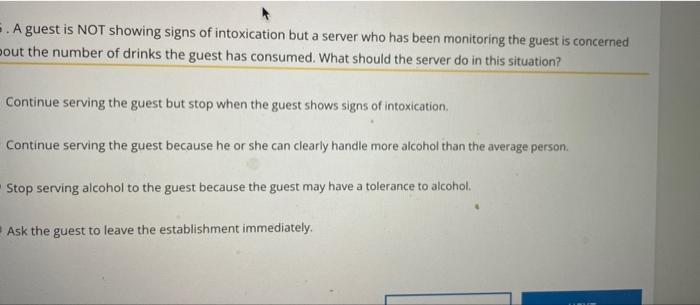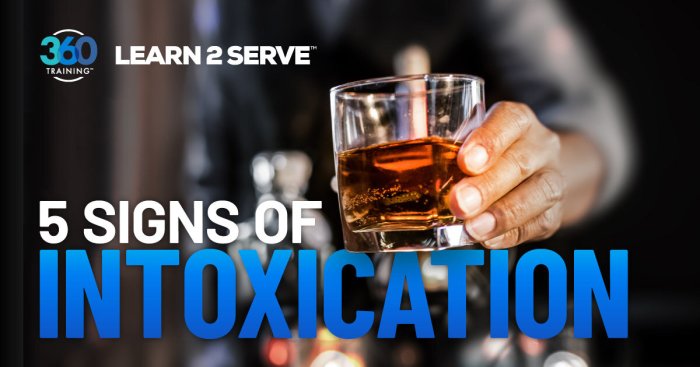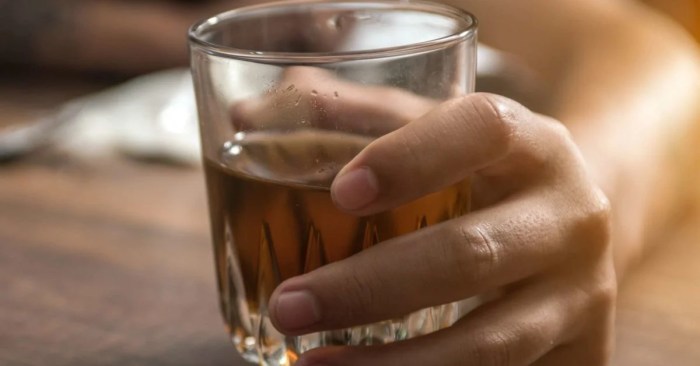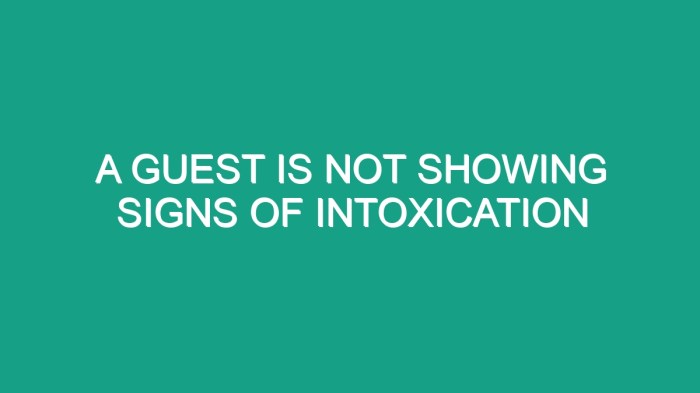When a guest is not showing signs of intoxication, it is important for hospitality professionals to be able to recognize the key indicators and communicate effectively to ensure a safe and enjoyable experience. This guide provides a comprehensive overview of the best practices for observing and assessing guest behavior, communicating with non-intoxicated guests, and monitoring and documenting their behavior over time.
By following the guidance Artikeld in this document, hospitality professionals can confidently identify and manage guests who are not showing signs of intoxication, ensuring compliance with legal and ethical responsibilities while maintaining a respectful and professional demeanor.
1. Observing and Assessing Behavior

Observing and assessing a guest’s behavior is crucial in determining if they are not showing signs of intoxication. Key indicators to look for include:
- Speech:Clear, coherent, and not slurred or disjointed.
- Coordination:Steady on their feet, with no noticeable swaying or stumbling.
- Balance:Able to maintain balance and walk in a straight line without difficulty.
- Facial Expressions:Relaxed and appropriate, not showing signs of confusion or disorientation.
- Eye Contact:Maintains eye contact during conversation, not avoiding or staring.
- Judgment:Demonstrates sound judgment and decision-making abilities.
- Inhibition:Shows appropriate restraint and control over their actions.
Tips for effective observation and assessment include:
- Observe the guest from a distance before approaching.
- Engage in conversation to assess their speech and coordination.
- Ask simple questions to gauge their judgment and inhibition.
- Pay attention to both verbal and nonverbal cues.
- Trust your instincts if something feels off.
2. Communication and Interaction
Communicating with a guest who is not intoxicated requires a respectful and professional approach. Maintain a calm and polite demeanor, even if the guest becomes difficult.
- Active Listening:Pay attention to what the guest is saying, both verbally and nonverbally.
- Clear Communication:Speak clearly and concisely, using simple language that is easy to understand.
- Empathy:Try to understand the guest’s perspective, even if you do not agree with their actions.
- Set Boundaries:Establish clear boundaries regarding acceptable behavior, while remaining respectful.
- Avoid Confrontation:If possible, de-escalate any potential conflicts by remaining calm and finding common ground.
3. Monitoring and Documentation

Monitoring a guest’s behavior over time is essential to ensure their safety and prevent over-consumption. Best practices include:
- Regular Observation:Observe the guest at regular intervals, especially if they have consumed alcohol.
- Detailed Documentation:Document any observations, including time, behavior, and any interactions.
- Accurate Reporting:Report any concerns to a supervisor or manager immediately.
Sample Monitoring Plan:
| Time | Observation | Documentation |
|---|---|---|
| 10:00 PM | Guest appears sober, no signs of intoxication. | Guest observed speaking clearly, walking steadily, and maintaining balance. |
| 11:00 PM | Guest’s speech becomes slightly slurred, and they stumble slightly while walking. | Guest observed with slurred speech, slight stumbling, and increased inhibition. |
| 11:30 PM | Guest is now showing clear signs of intoxication, with slurred speech, impaired coordination, and poor judgment. | Guest observed with severe slurred speech, impaired coordination, and inappropriate behavior. |
4. Legal and Ethical Considerations: A Guest Is Not Showing Signs Of Intoxication

Serving alcohol to an intoxicated guest can have serious legal implications. Hospitality professionals have an ethical responsibility to prevent over-consumption and ensure the safety of their guests.
- Legal Liability:Establishments can be held liable for injuries or damages caused by intoxicated guests.
- Ethical Responsibility:Hospitality professionals have a duty to protect their guests from harm.
- Handling Intoxicated Guests:If a guest becomes intoxicated after being served, the establishment should take appropriate steps to ensure their safety, such as calling a taxi or arranging for transportation.
5. Training and Staff Education

Training staff to identify and manage guests who are not showing signs of intoxication is crucial. A comprehensive training program should include:
- Identification Techniques:Training on the key indicators of intoxication.
- Communication Skills:Role-playing exercises to practice effective communication techniques.
- Monitoring Procedures:Training on how to monitor guests and document observations.
- Legal and Ethical Considerations:Education on the legal and ethical responsibilities of hospitality professionals.
Staff Evaluation:
- Regular evaluations to assess staff understanding and compliance with established protocols.
- Feedback and refresher training to ensure ongoing competence.
Questions Often Asked
What are the key indicators that a guest is not showing signs of intoxication?
Key indicators include clear speech, steady gait, and appropriate responses to questions.
How should you communicate with a guest who is not intoxicated?
Communicate respectfully, maintain eye contact, and use clear and concise language.
Why is it important to monitor and document guest behavior?
Monitoring and documentation help track guest behavior over time and provide evidence in case of any incidents.